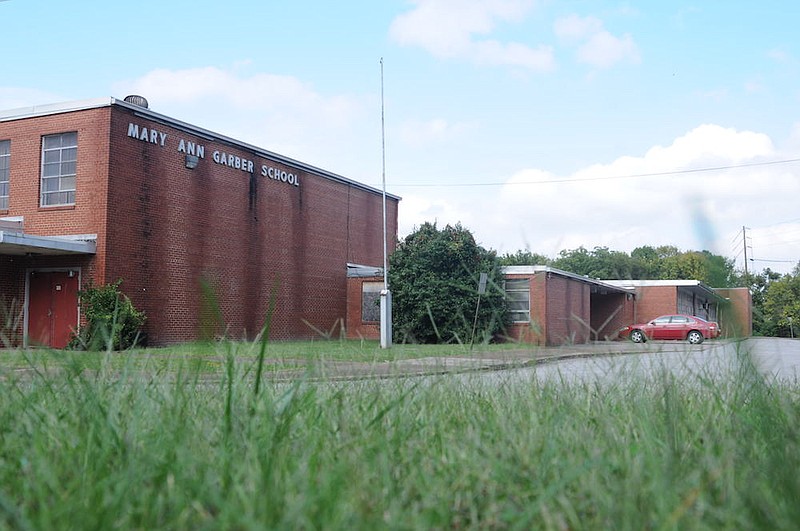A new horizon is just around the corner for many non-college-bound students with Wednesday's update on a new vocational center at the former Mary Ann Garber Elementary School in East Chattanooga, and all that will be necessary is for them to seize it.
The Building and Construction Workforce Center will offer training in masonry, carpentry, welding and HVAC, and construction work at an outdoor site. The center will be a partnership among the state, city, county, school district, Chattanooga State Community College, Chattanooga Area Chamber of Commerce and Associated General Contractors of East Tennessee (AGC).
Hamilton County Mayor Jim Coppinger told the county commission at its weekly meeting Wednesday the school should open by August 2022.
The school district currently offers vocational training at Sequoyah High School in the north part of the county, plus at some of its Future Ready Institutes, but their location makes it difficult for students who lack transportation.
"The world has changed," Hamilton County Commissioner Warren Mackey told another news source Wednesday. "Once upon a time, everyone needed and wanted a college education. But what we've realized is that more technology, robots, and applications are taking jobs away, and the work coming around in America today is predicated on what can you do and what value do you bring to the company. If you can bring something of value, you have a future."
According to the United States Bureau of Labor Statistics, brick and block masons earned a mean amount of $25.53 per hour in 2019. The pay for carpenters was $23.24 per hour, the median amount for welders in 2020 was $21.25 per hour, and the median amount for HVAC technicians in 2020 was $24.32 per hour. The 2020 median pay for construction workers was $17.83 per hour.
Ellis Smith, spokesman for Chattanooga Mayor Tim Kelly, said the mayor saw the reality Mackey was referring to daily at the car dealership he owned before selling it upon becoming a candidate. There, trained mechanics often made more than car salespeople, he said.
It's why, he said, Kelly put an emphasis on the importance of technical education during his campaign.
"It takes the commitment of all the parties involved to break ground on an idea," Smith said. "It's not the last step [for the city], either. It's just one of many [education-related] things we are looking at - all through the age levels."
The workforce center had its genesis in late 2018, according to newspaper archives, and a 501c3 among partners was signed in March 2020, only days before the global coronavirus pandemic shut things down.
Ken Hays, a retired local executive who is spearheading the project, said educators and contractors have developed the curriculum together, that contractors will be teaching many of the classes and that AGC as an organization has a commitment for 100% job placement with its students.
Despite a well-intentioned, strong push from the then-Hamilton County Schools superintendent in the early 2000s, college is not for everybody. For a better part of the last decade, this page and the Chattanooga Times editorial page have been nearly unified in pushing for an accessible vocational education center. About five years ago, as part of its Chattanooga 2.0, the Chattanooga Area Chamber of Commerce stressed the importance for local students to reach for some kind of post-high school training, be it college, technical training or certification.
Coppinger said some 200 high school juniors and seniors will be eligible for the new program and can get dual enrollment credit at Chattanooga State Community College. They would take traditional classes at their zoned schools in the morning and vocational classes at the center in the afternoon. Adults also will be trained at the site, though they will be separated from the students.
The fundraising goal to rehabilitate the building and open the center is $8 million, although the nonprofit organization has issued a request for proposals to finalize construction costs.
The state of Tennessee and Hamilton County have committed $2 million each, and the city - pending Chattanooga City Council approval - will match the $2 million from fiscal 2021 surplus funds. Also, private foundations and donors have committed $1.25 million, and AGC will kick in $500,000 and attempt to raise $250,000 from industry members.
The Hamilton County Board of Education is expected to transfer the Garber property to the county, which would then lease it to the nonprofit organization for $1, and the city - pending planning commission and city council approval - has committed to donate a two-acre parcel adjacent to the school for future expansion.
Mary Ann Garber closed as an elementary school in 2002 and subsequently has been used for storage, as a textbook depository and as the site of a season teacher supply depot.
We hope non-college-bound students of the future see this as we do - an opportunity to train with experts and have practically guaranteed employment in which they can have both the dignity of work and the reality of a family living wage job. Meanwhile, employers won't have to look outside of the city to find the skilled labor they need, and the city and county economy will grow as a result.
As Hays told commissioners, "it's a win-win situation."
